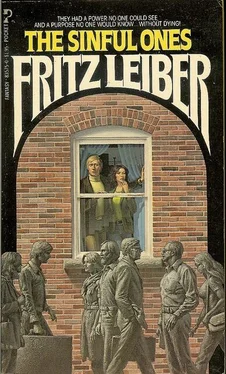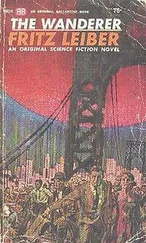How else explain the times when he had been ignored? By the dumpy man, Tom and the doctor. By the desk clerk at Marcia’s and by Marcia herself, when he had come minutes ahead of the clockwork rhythm. By Jane’s parents. By Marcia at the Pendleton party—she hadn’t been pretending to dance with someone as she twirled by herself; she had been mindlessly dancing with another clockworks figure (himself) that had moved from its proper place in the clockworks.
How else explain the times when he and Jane had been ignored? In the tavern, in the music shop, at the movie house, at the chess club. In the stacks of the library, in the streets of the Loop, at Goldie’s Casablanca. Or when Fred and he had been ignored—that crazy ride that should have set people staring and a dozen police cars and motor-cycles on their trail; and that crazy, unnoticed pursuit through the library.
How else explain the times when those other three had been ignored? The slap. Miss Hackman going through his desk. Mr. Wilson helping himself to the cigarettes. Their open talk in the tobacco shop and in front of Jane’s parents.
How else the things that hadn’t fitted? The dumpy man talking to the air. Pianos that played themselves and elevators that rose without occupants. Marcia calling him about the “wonderful evening” they’d spent together, when actually he’d run away. (For a moment he had a ghostly glimpse of her talking to an invisible companion at the Kungsholm, the waiter setting loaded plates before an empty chair. Jane’s mother stroking non-existent hair, whimpering to an absent girl. And now the cleaning woman mindlessly trying a door that, in the vast operation plan of a clockworks universe, was not supposed to be bolted; repeated the action, like a toy obstructed in mid-performance, until the appointed time came for her to finish cleaning his room and go away.
There were no other explanations. The universe was a machine. Teeming Chicago was a city of the dead, the mindless, the inanimate, in which you were more alone than in the most desolate wilderness. The face you looked at, the faces that looked at you, that smiled and frowned and spoke, had behind them only black emptiness.
Except for a few, a mostly horrible few.
What might some people do if they awakened to the knowledge that they alone had minds and consciousness, that they could do what they wanted and the machine could not stop them, that all authority was truly blind?
They would run amuck like soldiers in a conquered city, like drunken thieves in a department store at night. Treating all the people around them like the lay-figures they were. Exulting in their power. (He saw in his mind those three looking down at a sleeping Chicago.) Obeying all their hidden impulses. Satisfying all their secretest, darkest desires.
A few of them might band together, perhaps because they had awakened together. Say a wall-eyed blonde and an affable-seeming older man and a young man without a hand…
And a beast.
Jane had written, “Some animals are alive.” And he, Carr, had once been noticed when he shouldn’t have been, by a cat.
Yes, a few might band together. But except for that, they would be intensely suspicious. Afraid that some greedy, merciless group like themselves might become aware of them and destroy them, because absolute tyrants always fear and hate each other. Afraid, above all, that other people might come alive, more and more people, and punish them for their crimes.
As they satisfied their desires, as they had their “fun,” they would guiltily watch for the slightest signs of true life around them, in order to crush it out.
That was why those three had trailed Jane, why they had wanted to “check” on her.
The slap had been a test. If Jane had reacted to it, she would have been lost.
That was why Miss Hackman had searched his desk—for sights that he was something more than a mindless automaton.
That was why the small dark man with glasses was afraid. That was the great danger against which Jane had warned him, the “private underworld” she didn’t want to drag him into.
Three people preying on the dead city of Chicago, watching for the faintest hints of consciousness in the lay-figures around them.
Carr realized that he was shaking. Mustn’t they have seen him staring out the window at them this morning, conspicuous against the otherwise drearily unbroken façade? Mightn’t they even now be coming up the stairs, or standing noiselessly outside the door at which he was staring so fearfully?
He clenched his hands. All this was insanity, he told himself, a paranoid’s nightmare.
But…
His throat ached. He went to the bathroom, drank a large glass of water, set it down on the stained bowl. Then he lay down again on the rumpled bed. Fatigue smarted behind his eyelids, was like a fever in his flesh.
Presently he fell asleep.
When he awoke it was dusk. The room was all soft shadows. The window shade seemed faintly phosphorescent. His face felt fresh, as if it had just been sponged.
Instantly his thoughts began to race again, but the cooling refreshment of sleep had given them an entirely new perspective.
He had teetered on the edge of insanity, he told himself.
He had fallen victim to a terrible delusion.
He must root it out of his mind as quickly as possible.
He must talk to someone, someone who was close to him and sensible, and convince himself that it was a delusion.
Marcia—
She was real. She represented the businesslike normal side of things.
She’d be home now.
Of course he’d insulted her pretty badly the last time he’d been with her, leaving her that way at the Pendletons’.
Still, she was fair. She’d listen. She’d understand. She’d relieve his haunting anxiety.
He got up and rapidly put on his shoes and coat. He tried not to let his thoughts or emotions wander. His purpose was to get to Marcia before he lost the feeling of confidence with which he had awakened—the saving conviction that all his hideous delusions had been nightmarish fancies.
He met no one on the stairs except his slinking counterpart in the mirror. The entrance hall below was also empty, and dark. Then he pulled open the door and stepped out into what he assured himself was not a city of automatons.
A man was passing by at the foot of the steps, a little old man in a brown coat and hat, with deep-set eyes that scowled ahead and lips that worked as if he were muttering to himself.
Carr had the impulse to call out to him, to engage him in conversation, to assure himself at once of the falsity of his delusion.
But strangers sometimes ignored you when you spoke. Especially crazy-looking ones.
No, it must be someone closer, someone who couldn’t ignore him.
Marcia—
He walked rapidly. The sky was almost dark and a few stars could be seen. Soft glows from apartment windows made grotesque shadows. At intervals, streetlights glared. Narrow passageways between buildings were vertical black slits, except where side windows spilled illumination over brick walls a few feet away. Little shrubs crouched back against basement walls.
It was quiet. There were few figures on the streets. He tried unsuccessfully to avoid looking at the eyes of those he passed.
But people were that way in the city, he reminded himself. They’d pass you a foot away and not by the faintest flicker of their gaze betray an awareness of your existence.
This was Chicago, he told himself. Over three million inhabitants. A bustling metropolis.
Only tonight it was very quiet.
He had only one more street to cross before he came to Marcia’s apartment—that corner just ahead where there was a small cluster of lighted signs. On this side, a restaurant and a cleaner’s, the latter closed, both in an apartment hotel. On the other side, across the street, to his right, a cocktail bar decorated by scalloped banks of small electric lights.
Читать дальше









